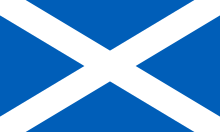Scottish nationalism
This article needs additional citations for verification. (March 2021) |

Scottish nationalism promotes the idea that the Scottish people form a cohesive nation and national identity.
Scottish nationalism began to shape from the 1920s to the 1970s and achieved present ideological maturity in the 1980s and 1990s.[citation needed] The nation's origin, political context and unique characteristics including the Gaelic language,[1][2] poetry and film maintains an individual's distinct identification and support of Scotland.
Origins[]
The Acts of Union merged both the Parliaments and Kingdoms of Scotland and England in 1707 to be "united into one Kingdom of Great Britain", but a separate legal system and distinct Scottish institutions continue to exist.[3]
Language[]
The languages of Gaelic[4] and Scots play a key role in nationalist identity.[citation needed] Linguistic independence is primarily associated with the poetry of Robert Burns, before experiencing a resurgence in the Scottish Renaissance, as led by Hugh MacDiarmid.[5]
Politics[]
Within politics, Scottish nationalism was held as a key ideology by the National Party of Scotland which later became the Scottish National Party. Their rise in popularity since the start of the 21st century led to the 2014 Scottish independence referendum. The referendum failed yet 44.70% of people in Scotland voted to leave the United Kingdom. Because of the United Kingdom decision to leave the European Union after the 2016 Brexit referendum, a second Scottish independence referendum has been proposed, as Scotland overall voted 62.0% against leaving the EU.[6]
In 2021, former SNP member and First Minister of Scotland Alex Salmond launched the Scottish nationalist Alba Party and announced it would run in the 2021 Scottish Parliament election.[7]
Popular Culture[]

Poetry[]
Hugh MacDiarmid (1892 - 1978) was a Scottish poet, considered one of the principal forces behind the Scottish Renaissance, he had a great influence on Scottish culture and politics.
Film[]
Braveheart (1995) is a historical war film that portrays the life of William Wallace during the First War of Scottish Independence, Mel Gibson portrayed Wallace as well as directing the film, screenwriter Randall Wallace based the film on the poem The Wallace by Blind Harry. Although the film caused a rise in Scottish nationalism, with Lin Anderson, author of Braveheart: From Hollywood To Holyrood, claiming the film helped Scotland get its own devolved parliament,[8] the film has been criticized for its historical inaccuracy, with its inaccuracy entering into popular culture itself.[9] A more accurate film of the Wars of Scottish Independence was written and directed by David Mackenzie, this being Outlaw King, this being said it has faced its own criticises for inaccuracy, a notable example is how Robert the Bruce is portrayed as enigmatic and well-behaved man of the people who desires to restore Scotland to its inhabitants, however, historian Fiona Watson notes the real Robert I was most likely cold, canny, and driven by his personal ambition, and Edward II, Bruce's enemy, was depicted as a cruel and oppressive person who is eager to succeed his father despite any historical evidence of Edward II having displayed such traits, however Edward II was reluctant to assume the mantle of kingship and was known to be generous with his servants.[10]
See also[]
References[]
- ^ "Scottish Gaelic".
- ^ "Scottish Government Gaelic Language Plan 2016-2021".
- ^ G. M. Trevelyan, Ramilies and the Union with Scotland (Fonatana) p. 285-6
- ^ "Scottish Government Gaelic Language Plan 2016-2021".
- ^ P. S. Fry/R. Mitchison, The History of Scotland (1989) p. 209
- ^ "SCOTLANDʼS FUTURE YOUR GUIDE TO AN INDEPENDENT SCOTLAND" (PDF). gov.scot. gov.scot. 1 November 2013. p. i. Retrieved 18 November 2019.
- ^ "Former SNP leader Alex Salmond launches new political party". BBC News. 26 March 2021. Retrieved 28 March 2021.
- ^ "Wallace movie 'helped Scots get devolution' - [Sunday Herald]". 2013-07-02. Archived from the original on 2013-07-02. Retrieved 2021-03-28.
- ^ "The 10 most historically inaccurate movies - Times Online". 2011-06-15. Archived from the original on 2011-06-15. Retrieved 2021-03-28.
- ^ "What 'Outlaw King' gets wrong - according to a historian". www.scotsman.com. Retrieved 2021-03-28.
External links[]
 Media related to Scottish nationalism at Wikimedia Commons
Media related to Scottish nationalism at Wikimedia Commons
- Scottish nationalism
